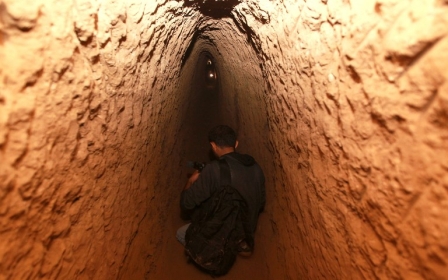Pentagon chief calls for negotiations to end war in Yemen
Washington wants a return "as quickly as possible" to UN-backed Yemen peace talks, US Defence Secretary Jim Mattis said as he began a Middle East tour on Tuesday in Saudi Arabia.
The United States provides limited military support to a Saudi-led coalition which for two years has been fighting in support of Yemen's government against the Houthi rebels.
At least 10,000 people have been killed and more than three million displaced in the war, now in its third year. Millions of people are also threatened by famine.
Washington provides intelligence as well as aerial refuelling to coalition warplanes conducting air strikes in Yemen with US-supplied weapons.
Rights groups have repeatedly criticised the coalition bombing campaign in Yemen for causing civilian casualties.
Asked by reporters about the chance of stepping up American support, Mattis did not reply and instead emphasised the return to peace talks.
"Our aim is that this crisis can be handed to a team of negotiators under the aegis of the United Nations that can try to find a political solution as quickly as possible," he said as he flew to Riyadh.
Seven ceasefires alongside peace efforts by the United Nations have so far failed to stop the fighting.
It is necessary to end the "firing of missiles provided by Iran against Saudi Arabia" as well as "the death of innocent people in Yemen", Mattis said.
Yemen's Houthi rebels allied with troops loyal to ex-president Ali Abdullah Saleh have fired ballistic missiles into Saudi Arabia.
Rebels have also shot short-range rockets over the kingdom's southern border, killing least 130 soldiers and civilians.
Washington alleges that Iran, Saudi Arabia's regional rival, has shipped missiles to Yemen but Tehran denies the charge.
A UN Panel of Experts in January reported that it "has not seen sufficient evidence to confirm any direct large-scale supply of arms" from Iran.
Some in US President Donald Trump's administration would like to increase American military support for the Saudi-led coalition to better counter Iranian ambitions in the region.
Saudi Arabia regularly accuses Tehran of interference in the Middle East, and Mattis has called Iran the world's "biggest state sponsor of terrorism".
Riyadh has expressed optimism that Trump's team will be more engaged in the region, particularly in containing Iran, compared with former president Barack Obama.
In December, the Obama administration blocked a sale of precision guided weapons to Saudi Arabia because of concerns over civilian casualties in Yemen.
But Last month, the US state department announced it wanted to move forward with the sale, which still needs to be approved by Congress, where Saudi Arabia is facing growing criticism over its campaign in Yemen.
Earlier this month, four US Senator proposed a bill to suspend the sale of air-to-ground munitions to Riyadh until Washington makes sure that the Saudi air force is taking the necessary precautions to avoid civilian casualties.
“The United States has no business supplying a military that targets civilians or enables terrorist groups to thrive, but that’s exactly what we’re doing right now in Yemen,” Democratic senator Chris Murphy, who co-authored the bill, said in a statement on 13 April.
Meanwhile, a Saudi military Black Hawk helicopter has crashed in Yemen, killing at least 12 military personnel, Saudi official news agency SPA reported on Tuesday.
The cause of the crash was not known and is being investigated, SPA said.
Middle East Eye propose une couverture et une analyse indépendantes et incomparables du Moyen-Orient, de l’Afrique du Nord et d’autres régions du monde. Pour en savoir plus sur la reprise de ce contenu et les frais qui s’appliquent, veuillez remplir ce formulaire [en anglais]. Pour en savoir plus sur MEE, cliquez ici [en anglais].




